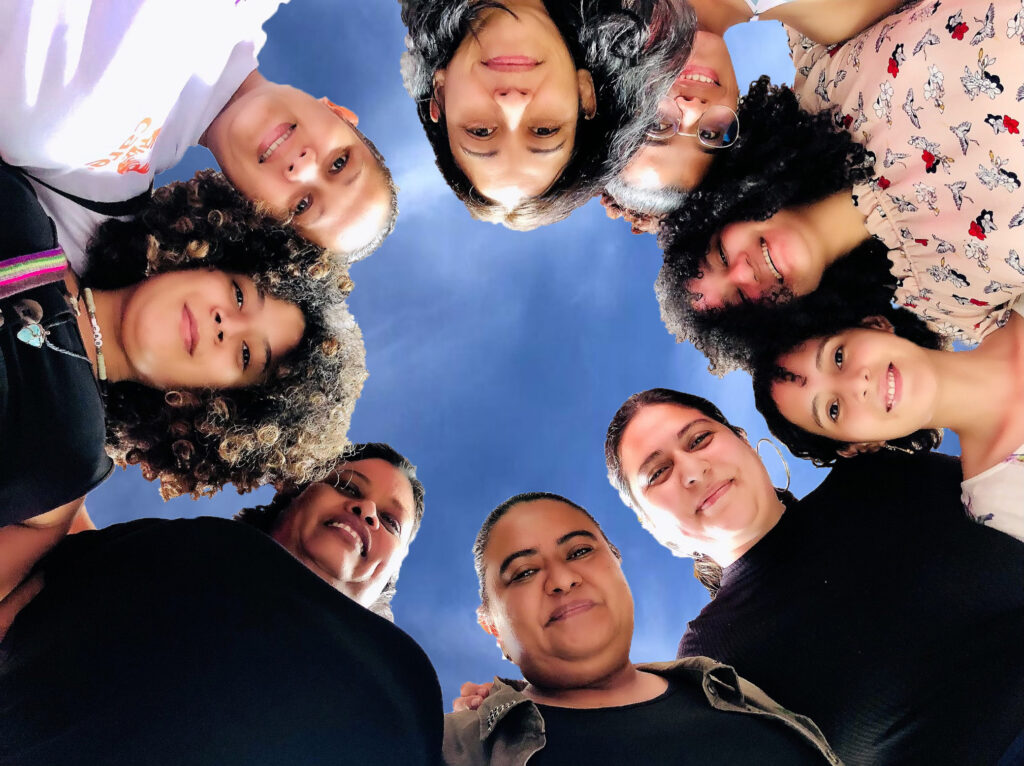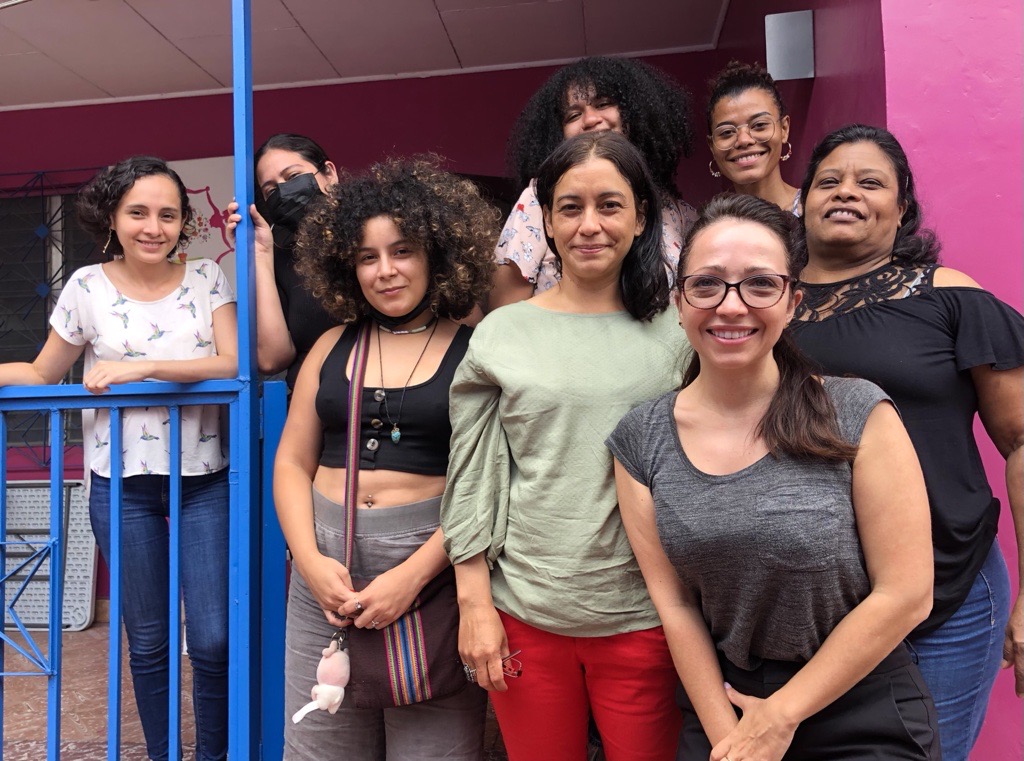In Honduras windows are opening while the curtains are still closed. It seems possible to get a glimpse through them into a brighter future. Act Church of Sweden supports several organizations working with women’s rights in Honduras. This year Janete and Charlotte from the Latin American department met some of these organizations during a monitoring visit.

It’s 4:50 am. The driver never showed up. While Charlotte and I wait for a new driver I search more information online about the destination we will fly to, San Pedro Sula. The data seems to be a couple of years old, but the place is ranked as Latin America’s most dangerous city, with the highest homicide rate. Another website describes it as “the world’s most violent city for a second year in a row”. Leaving cold and rainy Tegucigalpa behind, I pondered on what that meant.
Already in San Pedro Sula nothing tells me about what I just read, but the weather change is clear. It is very hot, humid and seems livelier. We head to Foro de Mujeres por la Vida which is a feminist platform for women and women’s organizations to work together in the construction of autonomous processes of growth, reflection and promotion of rights for full participation in society. They provide education for women, case accompaniment and offer safe houses for survivors of domestic violence.
COVID19 and gender-based violence
We arrive to this office with a long table and 9 women all wearing their face masks. These ladies are very welcoming and seem not to mind my accent, I suppose they are smiling. The COVID 19 pandemic has hit Latin America very hard, so we are conscious about following protocols. Another member attends the meeting online as she is in isolation.
During our long discussion on ongoing projects, budgets and meeting milestones; I asked to be excused to talk aside to a few of their members. I am interested in their daily lives and challenges. I was also intrigued about San Pedro Sula’s dangers and how they cope with them. They all nodded when our host mentioned they never walk alone specially at night and whenever they go somewhere, they are to constantly inform their whereabouts to calm down the nerves of family and friends.
While COVID19 seems not to make headlines any longer in Sweden, they informed that there were several hurdles during the pandemic and with the pandemic ongoing these changes seem to also have become the new normal. As lockdowns started the incidence of gender-based violence claims escalated. The team had a spike of cases but due to lockdowns they saw themselves unable to attend to the victims. The work of the defenders was not recognized of importance for them to receive a pass and be allowed to drive through the lockdowns. They informed me that there was a case where one gender-based violence survivor walked 20 kilometers to their office after being injured by her partner. During COVID19 court cases also became affected; they went from lasting for just a couple weeks to taking five months, and so it remained to date, making affected women even more vulnerable while waiting.
The UN indicated that 27,8% of the Honduran women have suffered physical and/or sexual violence from an intimate partner. Honduras has the highest femicide rate in Latin America, with 95% of these crimes going unpunished.
A taboo that cannot be discussed in schools
In Honduras, the situation for women and girls that suffered sexual violence is also appalling, the day after pill is forbidden (yet it can be found illegally at high prices). Abortions are constitutionally illegal even in cases of rape and carry heavy sentences. Traditionally, pregnant girls are not encouraged to keep studying. When I asked about sexual and reproductive health and rights education in schools, they mentioned this to be such a taboo that it cannot be discussed in schools and certainly not with policies nor advocacy. With regards to policies they added that there is a long way to go as the integral protection law for women is being worked on and it is still needed a mechanism to support women and girls victims of violence, psychological support and to strengthen investigation in cases of violent death. Besides that, a law on safe houses is also lacking, so that women would have a safe space to head to in cases of domestic violence.
In Honduras, 26 % of women give birth before the age of 18 and 33% of women (aged 20 to 24 years) were first married or in union before reaching 18 years in age. As women’s rights defenders they also requested me caution to share information about them and their work. They must be careful with getting attention. The work of human rights defenders is generally defamed in order to discredit them and they recurrently receive threats.

Possible signs of a brighter future
As we are invited for lunch and I am enjoying the tastiest chayote ever, the discussion becomes heated and Alvin, who has been driving us around in San Pedro Sula, after conservative comments receives a lesson on why sexual orientation for children and adolescents is important and why conservatism is doing more harm to the society. Upon return, he informed he will certainly convince his wife, a teacher, about the importance of sexual education for her pupils. Charlotte and I could not contain our giggles and as we finished our day with many mixed feelings yet certainly happy we had the chance to talk to these brave women fighting so ardently for the rights of other women. A very heartwarming experience.
In January 2022 Iris Xiomara Castro Sarmiento took office, becoming the first female president of Honduras. On her speeches she often advocated for the empowerment of women and women’s reproductive rights as she promised an abortion reform (to allow abortion in cases such as fetal impairment, rape and risky pregnancy – as currently abortion at any stage and for any reason is constitutionally prohibited), including to revise the ban on emergency contraception. However, the president is already encountering strong opposition to push this agenda and public opinion remains conservative. She is also the first leftist president, changing the status quo of a patriarchal society with several decades of military and conservative ruling. More information on the electoral process you may read here (Swedish). During her leadership it has been noticed the creation of a secretary for women who took up consultations to work on the integral protection law against violence against women.
While it remains too early to be able to peak through, Honduran women seem to be coming out of the hopelessness to see a window of hope. It is important that the international community takes the chance to seize the moment while the window is open. Advocacy is needed to end violence against women, pass important laws on protections and safe houses, establish well-functioning mechanisms and institutions to support women and ensure the right and understanding of family planning.
Author: Janete Rebizzi
| In Honduras, Act Church of Sweden supports several organizations working with women’s rights: |
| Las Ecumenicas Por El Derecho a Decidir is a feminist organization of women believers in several faiths. They work with youth activists on battle against religious fundamentalism affecting women’s rights. They have an observatory taking notes of cases of violence against women. Currently they are working with the European Union Spotlight Initiative – Honduras’ First Inter-Religious Dialogue. Las Hormigas is an organization working with the Lencas indigenous groups on prevention of gender-based violence. CoS is supporting them to work with capacity building and institutional strengthening, they provide consultations with lawyers and psychologists. Centro de Estudio de la Mujer en Honduras (CEM-H) works against violence using art and theater, with students in educational centers. They also work with advocacy and trainings to strengthen the protection capacities of women’s rights organizations and provide with case management. Centro Bartolome de las Casas (CBC) uses an integral approach of gender and masculinities, by sensitizing and training men for equity and on the prevention of gender-based violence and the transformation of sexist behaviors and attitudes. (games, plays, training, advocacy). Protection International supports human rights defenders in developing their security and protection management strategies. CLAVES – Through participatory, playful and creative proposals, it develops children and adolescents’ capacities against violence, develops adult capacities for treatment, care and gender equity. Production of programs, teaching materials, training of educators and technicians, institutions and networks. Biblical-Theological Reflection. Awareness campaigns with children and adolescents. Public Advocacy. |

Lämna ett svar